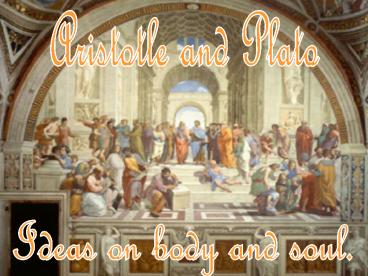Aristotle and Plato - PowerPoint PPT Presentation
1 / 10
Title:
Aristotle and Plato
Description:
'The soul is like a charioteer. in charge of two horses.' - Plato ... The mind represents the charioteer as it as seen in the middle' of the two. ... – PowerPoint PPT presentation
Number of Views:1150
Avg rating:3.0/5.0
Title: Aristotle and Plato
1
Aristotle and Plato
Ideas on body and soul.
2
Aristotle
Aristotles ideas on body and soul can be found
in de Anima. Aristotle thought that the body was
the physical matter of the living being and the
soul as its form. This idea of form is
different to Platos idea of forms. Aristotle
thought that your form covered all
characteristics and functions including
sensation, movement and reproduction. Aristotle
was a monist and saw the living being as a
composite whole.
3
Body
Aristotle was a monist so he saw a living being
as a whole composite. However he said the body
was the physical matter which enabled action and
gave the being its name. One part Aristotle
thought could not exist without the
other. Example A bird is given that name because
of its physical matter. But a bird cannot be a
bird without a soul equally there can be no bird
without the body.
4
Soul
Not Physical
The soul is the structure of the body, its
organisation and function. The nature of the soul
will depend on the type of being it is. All
beings are arranged in a hierarchy according to
Aristotle. Example A plant only has a
vegetative soul which enables it reproduce
appropriately. A bear would have a soul further
up the hierarchy because a bear can have desires
and feelings (a souls appetite). This gives them
the ability to move. The soul of a human has a
defining quality which sets it above all others.
This is the power of reason. Aristotle gave this
example Suppose then that the eye were an
animal- sight would have been its soulwhen
seeing is removed the eye is no longer an eye,
except in name- it is no more a real eye than the
eye of a statue or of a painted figure.
5
Plato's ideas
- Plato was a DUALIST. He believed that the soul
and the body are separate. - The real identity of the person lies with the
SOUL. - The soul has existed before being in the present
body, in the realm of forms. Here it was able to
see the perfect forms of all matter. - Plato believed that though the body dies and
disintegrates, the soul continues to live
forever. After the death of the body, the soul
returns to the realm of forms - However when the soul takes possession of the
body it forgets the perfect ideas and sees only
shadows (copies) of the perfect forms.
6
Plato's ideas continued...
- The soul is on a higher level of reality than the
body, being immortal with understanding of the
realm of ideas - The body exists in the physical world where the
senses see copies of the true forms. - SO the body is concerned with the senses, and
the soul is concerned with reason - TRUE KNOWLEDGE a memory of the true forms which
the soul had before it entered the body. - The soul is not always perfect however, the body
corrupts it and drags it down. - Plato thought that only the soul could perceive
the ideal forms. When the body and the soul
combine, the body obstructs the soul's ability to
recall the ideal forms.
7
"The soul is like a charioteer in charge of two
horses." - Plato
The two horses represent the body and soul. The
mind represents the charioteer as it as seen in
the middle of the two. The body and soul have
conflicting feelings and ideas and the mind has
to decide which one to follow.
8
vs.
9
Body and Soul are separate, the soul existed
before the body. The soul lives forever. The soul
I s on a higher level, the body is distracting.
The soul has innate knowledge. The body is
concerned with senses and the soul with reason.
Body and soul are one they cannot exist without
the other. Souls are arranged in a hierarchy and
a human soul is at the top of this hierarchy. The
body is the physical matter and the soul is the
structure and organisation of one composite whole.
10
The end






![get⚡[PDF]❤ Epistemology after Protagoras: Responses to Relativism in Plato, Aristotle, PowerPoint PPT Presentation](https://s3.amazonaws.com/images.powershow.com/10051075.th0.jpg?_=202406080911)
























